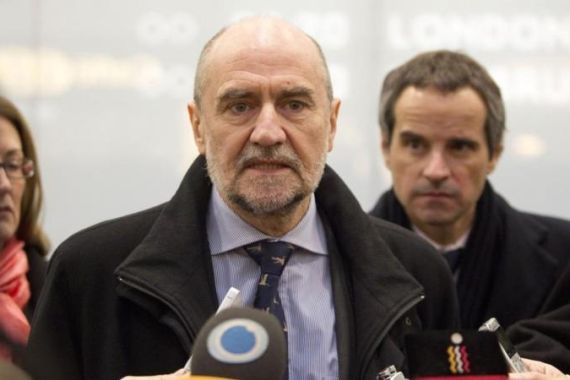Nuclear inspectors fail to reach deal in Iran
The deadlock is a chilling signal for a wider effort by six major powers to get Iran tackle the decade-old nuclear row.

UN inspectors have returned to Vienna from talks in Tehran with no deal on access to Iran’s nuclear sites and no date for new talks.
“Despite its many commitments to do so, Iran has not negotiated in good faith,” said a Western diplomat accredited to the United Nations’ International Atomic Energy Agency (IAEA) in Vienna who was not at the talks.
“It appears that we now have to ask ourselves if this is still the right tactic.”
The deadlock is a chilling signal for a wider effort by six major powers to get Iran to curb a programme that they fear could give it the capacity to build a nuclear bomb.
The IAEA and Iran “could not finalise the document” setting out terms for an IAEA inquiry into possible military dimensions of Iran’s nuclear programme, chief UN inspector Herman Nackaerts said at Vienna airport after returning from Iran.
He said no new date had been set for talks that had shown no progress in more than a year, adding, “Time is needed to reflect on the way forward.”
The United States, Russia, China, France, Britain and Germany are due to meet Iran for separate talks in Kazakhstan on February 26 to tackle a decade-old row that has already produced four rounds of UN sanctions against Iran.
But the Islamic Republic denies any military dimension to its work and is asking for acknowledgement that it is entitled to produce nuclear fuel for peaceful purposes.
With Iran heading towards presidential elections in June, it may make it hard for any official to be seen as making concessions to foreign powers, especially the US and Israel.
“On behalf of the Iranian nation, I say that whoever thinks that the Iranian nation would surrender to pressure is making a huge mistake and will take his wish to the grave,” President Mahmoud Ahmadinejad said on Thursday, according to state television.
Iran is expanding a stockpile of higher-grade 20-percent-enriched uranium ever closer to levels where a critical mass of weapons-grade material would be only a short step away – something that Israel, the only country in the region believed to possess nuclear weapons, says would be a “red line” for action.
The US has also warned, in less direct terms, that it will do what it takes to prevent Iran getting the bomb.
Late last year it set a March deadline for Iran to start cooperating with the IAEA’s investigation, warning Tehran that it might otherwise be referred to the UN Security Council.
Tehran has said intelligence information pointing to nuclear weapons research in Iran is forged and baseless.